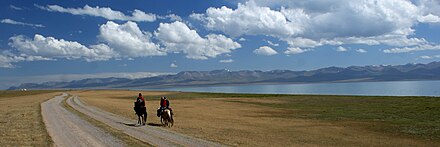Song Kul is a high alpine lake in the mountains of the Naryn Region of Kyrgyzstan.
Understand
 It is the second largest lake in Kyrgyzstan (18x29 km wide, 13 m deep) after Issyk kul. Its name, meaning "following lake", is popularly considered to refer to this relation. It is surrounded by a broad summer pasture and then mountains. The area is inhabited and safely accessible only from June to September.
It is the second largest lake in Kyrgyzstan (18x29 km wide, 13 m deep) after Issyk kul. Its name, meaning "following lake", is popularly considered to refer to this relation. It is surrounded by a broad summer pasture and then mountains. The area is inhabited and safely accessible only from June to September.
Get in
Its beauty is greatly praised, but it is rather inaccessible. The best approach with your own car seems to be the 85 km road from Sary-Bulak on the main north-south highway. Other routes require 4x4s. It is very common to do a organized day trip by horse or hiking from Kochkor or less frequented from Naryn. CBT can arrange return transport for US$80-100 per car from their offices in Kochkor (which can be reached by marshrutka from Bishkek) or for a much higher price from their office in Bishkek. Some companies like Iron Horse Nomads can bundle the transportation from Bishkek with CBT housing and an English speaking driver who stays with you with prices starting around US$350. Agencies can also organize foot or horse treks to the lake.
Without tour agency
It is easily possible to get to Song Kul without paying to any agency. On option is to go here by rented car, but even that is not necessary. You can hitchhike to Kyzart village or Kyzart pass and continue on foot from there. Kyzart village is located 77 km from Kochkor in the direction to Osh, while Kyzart pass is 55 km from Kochkor in the same direction. If hitchhiking from Kochkor, get to the crossroad behind the city (I will see it no a map) and hitch-hike some truck, as these are plentiful and truck drivers tend to refuse money.
If hitch-hiking is not your thing, you can go to the main square in Kochkor and haggle with taxi drivers to take you there. A seat in shared taxi should be around 200 som and a whole car should be no more than 1,000 som.
From Kyzart pass, follow the trail marked on OpenStreetMap. It is 27 km, a relatively easy two-day hike. A good places to sleep are near river Bazarturuk, which this hike crosses. You can pitch your tent there or ask in some yurt.
From Kyzart village, it is 28 km, you can however ask some local taxi driver to take you to the beginning of the trail near the river, from where it is only 16 km doable in one day. Most of this trek is however a boring, slow ascent, so it might be better to walk from Kyzart pass a go back to Kyzart village.
Alternatively, you can even hike the whole way from Kochkor (~80 km), and head out north to Kyzart from the lake.
Get around
There is nothing like public transportation on the circular road around the lake and the road is often in very bad shape. There are however some cars going on this road very often, you can try to hitchhike some of these to get where you need. Otherwise, you will have to walk a lot—the lake is quite large.
Navigation
As the trails around, to and from the lake are quite long and it is important to have a proper map with you. For reliable maps and comprehensive trails and map information including GPS, consult OpenStreetMap, which is used by this travel guide, and by many mobile Apps like OsmAnd or Mapy.cz.
See
There almost no man made structures to see, as local people take the yurts wild them.
- A mausoleum, 41.8918914°, 75.2067867°. Maybe the only stone building near the lake. Very photogenic tomb at the shore. 2018-10-26
Do

- Climb the mountain behind the yurts for a great view over the lake. Takes several hours to get to the top.
- Milk a mare. (You can really do this, if you ask your hosts)
- Take a guided horse tour around the lake. No agency needed, you ask at some larger yurt cluster.
- Swim in the lake. Good beaches are marked on OpenStreetMap.
Buy
There is nowhere to buy anything else other than meals or kumys around the lake.
Eat
Local herders will provide interesting meals (sometimes including horse) along with the accommodation. If a lot of tourists are expected, you can watch them butcher a whole sheep in under 30 min. Besh-barmak ("five fingered food") is among the most popular dishes with greasy noodles, all the innards of the sheep, and of course lots of meat!
Drink
Try the "kumys" (fermented mare's milk) that is a popular and healthy drink famous in all of Kyrgyzstan from this area.
Sleep
Local herders can provide supplies and rent yurts for about $14 per night including meals. Apart from that, there are no facilities on the lake. Agencies, including CBT, can arrange these in advance but it is also possible to just show up.
Cope
Before paying for a 2-3-days horseback riding tour, it is better to try it for a few hours or a day. If you are not used to riding a horse, a longer ride might cause your body to be in pain for several days during and after a long ride. Many travellers complain about the painful experience even after even just one day of riding.
Connect
There is no cell signal nor Wi-Fi.